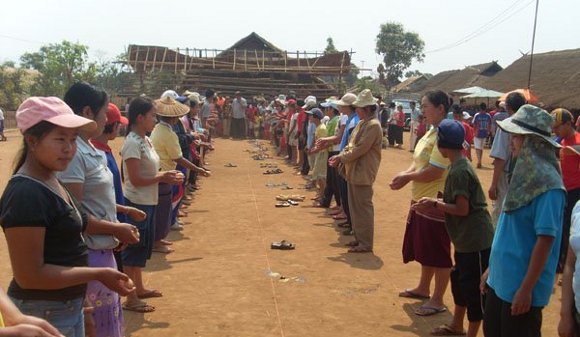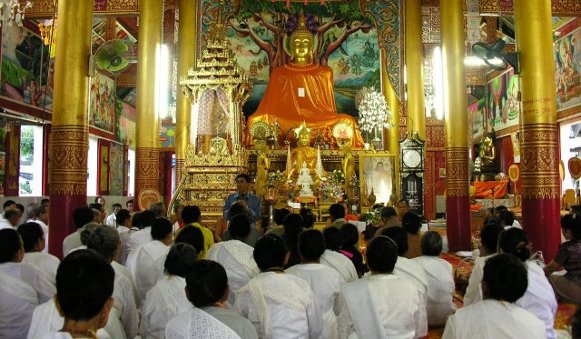Shan Women’s Action Network (SWAN) was set up on 28 March 1999 by a group of Shan women active in Thailand, inside Shan State and along the Thai-Burmese border, to address the needs of Shan women.

Before the formation of SWAN, Shan women in various locations had already been active in a number of projects to assist women. Even though informal networks were in place, it was felt that more could be achieved, in addressing both practical and strategic needs of Shan women, if a more concrete network among the various women could be formed. This Shan women's network would also be able to coordinate with other women's organisations from Burma, as well as other organisations working with women locally, nationally and internationally.
The organisation is commited to working for gender equality and justice for Shan womenin the struggle for social and political change in Burma through community-based action, research and advocacy.
SWAN runs programmes in Information and Documentation, Crisis Support, Women’s Empowerment, Health, Education, and Income Generation,
Programmes
Information & Documentation Programme
- Production of Shan, Burmese and English-language newsletters, booklets, posters and leaflets on gender issues and human rights.
- Documentation of violence against women.
- Publication of reports on the situation of women inside Shan State and Thailand.
Crisis Support Programme
- Running two centres for women in crisis.
- Providing emergency assistance to migrant women and children in crisis (access to health services, clothing and food).
- Networking with other local organisations to provide legal and other support for emergency cases.
- Conducting handicraft-production and other vocational trainings.
Women's Empowerment Program
- Conducting training on leadership, gender, documentation methods and human rights.
- Offering a year-long internship programme for Shan women to build capacity levels to run community-based programmes along the border and inside Shan State. From 1999 to 2008, 25 young women were trained as interns with SWAN, and most of them are working full-time at SWAN and community-based organisations along the border.
- Organising and supporting Women’s Exchange meetings at six locations on the Thai-Shan border.
Health Programme
- Running three community health centres for migrants and displaced populations on the Thai-Shan border.
- Providing basic health care, including maternal and child care, to these communities.
- Awareness-raising on preventative health care, especially for reproductive health, and HIV/AIDS.
Education Programme
- Operating sixteen schools (nine schools providing basic literacy skills and seven nurseries) with the collaboration of the Shan community along the Thai-Shan border.
- Providing Shan language text books.
- Organising training and networking meetings for teachers.
Income Generation Programme
- Selling paper dolls.
- Making conference bags to order.
- Producing traditional Shan fabrics and garments.

Major achievements
SWAN co-hosted the “Trust Building for Peace Conference,” held from 26-28 November, 2012, at the Royal Rose in Rangoon. It was initiated by the Shan Nationalities League for Democracy (SNLD) and co-organised by Shan civil society organizations, including Kaw Dai, Hsai Pen Media Group, the Shan Literature and Culture Association in Rangoon and SWAN.
The conference was attended by over 170 participants, including leading Shan scholars, members of three political parties, four ceasefire armed groups and eleven civil society organizations from 42 townships. The conference included 17 presentations, including two from SWAN, and involved workshop discussions on the peace process and current developments in Shan State, the amendment of the 2008 constitution, increased militarisation, and the need for a genuine Federal Union in Burma for sustainable peace.
Participants highlighted that the current ceasefire agreements have yet to result in political dialogue, and there is an urgent need to address critical issues such as increasing drug abuse, displacement, economic problems, environmental degradation, human rights violations, and the disappearance of Shan literature and culture. There is also a need for people’s participation in the peace process at all levels. Results were also presented of a survey on the peace process completed by over 2,500 people from most townships in Shan State.
At the end of the meeting, a press conference was held on 28 November, attended by over 50 Burmese and foreign journalists. Representatives from the SNLD, Shan Nationalities Democratic Party, Tai Leng Nationalities Development Party, Restoration Council of Shan State, Shan State Progress Party, the National Democratic Alliance Army-Mongla, SWAN and Shan scholars were present at the media conference.






